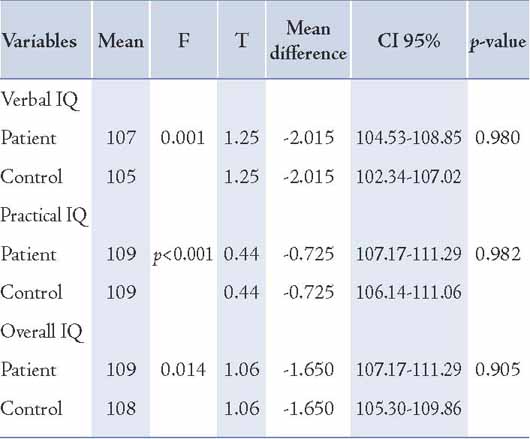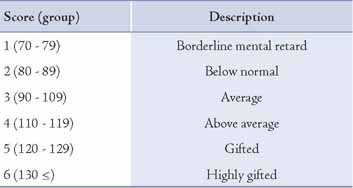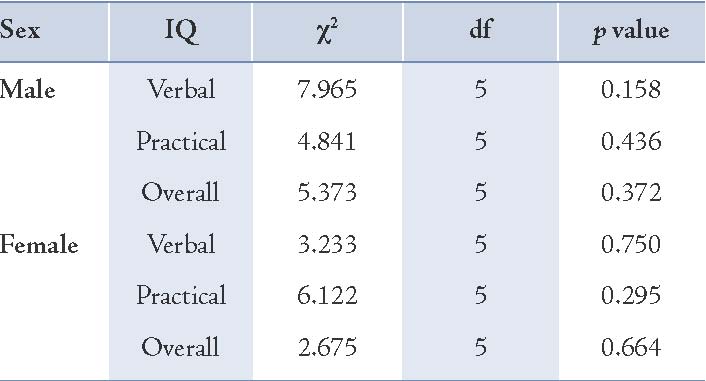|
Abstract
Objective: Intelligence quotient is an indicator of one's efficacy and many factors including chronic diseases may impact upon it. This study aims to compare the IQ of children diagnosed with moderate asthma to the IQ of healthy children.
Methods: This comparative study was conducted between June 2011 and January 2012 in an Academic Referral Clinic. In this study, 114 patients aged 6 to 13 years who were diagnosed with moderate asthma were compared with 90 age and sex matched healthy patients from their families. Wechsler intelligence scale for children was used by split half method to calculate the overall IQ, verbal IQ and practical IQ. The t-test and Chi square test were used to analyze quantitative variables and qualitative variables, respectively.
Results: In this study, 204 children, 114 (56%) in the case group and 90 children (44%) in the control group participated in comparing their IQs. One hundred and fifteen (56%) were males and 89 (44%) were females. The overall IQs of asthmatic patients and healthy patients were 109 and 108, respectively; the difference was not significant (p=0.905). Furthermore, there was no significant difference in the IQ scores between males and females.
Conclusion: Although asthma is a chronic disease and causes many respiratory problems, it has no negative impact on IQ.
Keywords: Intelligence quotient; Children; Asthma; Respiratory; Prevalence.
Introduction
The prevalence of allergies varies around the world. Asthma is one of the most common chronic diseases among children.1 According to published studies, the prevalence of allergic diseases, such as asthma is increasing around the world, especially in domestic settings. A meta-analysis conducted in Iran showed that wheezing in children aged 6-7 and 13-14 years in the past 12 months was 7.6% (95% CI: 5.6 to 9.8) and 10.7% (95% CI: 8.9 to 12.7), respectively.2 The prevalence of asthma in children has doubled in the past 20 years. Asthma is categorized according to its severity into mild intermittent, mild persistent, moderate intermittent, persistent, and severe. In moderate asthma, the symptoms last for more than 3 days but less than 7 days per week. It presents with nocturnal symptoms more than once a week and relative constrains in daily activities. In spirometry, the FEV1 is 60% to 80%. Allergic diseases have negative financial and social impact on the family and society, and asthma causes many morbidities and deaths. The disease is the most common cause of referrals to emergency rooms and school absences. It can also increase emotions, stress and mental problems which can affect the patient’s learning.
The definition of intelligence is different among psychologists.3 These definitions include: a) Mental capability of abstract thinking and reasoning, b) Learning ability and increasing information, and c) Ability to solve problems. Chronic disease may affect cognitive performance.4 The effects of chronic diseases such as epilepsy,4 cancer,5 and asthma,6 on children’s cognitive performance have been previously reported. Chronic obstructive pulmonary disease (COPD) is a chronic lung disease and a major risk factor for cognitive impairment due to chronic hypoxemia.7,8 It is our opinion that asthma is a chronic lung disorder that may affect cognitive performance, although severity and the duration of illness are important factors to be considered.
Extrinsic asthma is associated with atopy and has no significant effects on children’s cognitive performance. Contrary to other chronic diseases, in one study, there was no difference in cognitive performance between patients with chronic disease and the control group, however, patients with chronic disease were associated with a higher absence rate from school.9 Few studies have examined the relationship between IQ and asthma. By defining this relationship and controlling asthma, effective measures can be undertaken to improve the quality of life and school performance of asthmatic children. Therefore, this study aims to assess the IQs of children aged 6 to 13 years with moderate asthma compared with a healthy control group.
Methods
This comparative study was conducted between June 2011 and January 2012 at Tuba Clinic Center, Mazandaran University of Medical Sciences, Iran. One hundred and fourteen children with moderate asthma participated in the study. The age of the children ranged from 6 to 13 years. The control group consisted of 90 healthy children. Data including age, sex, previous history of asthma and medical history of patients were obtained by interviewing the parents and reviewing the patient’s medical records. The Wechsler intelligence scale for children was used to calculate their IQ, and the study subjects were enrolled through consecutive sampling. The inclusion criteria for patients finto this study included: 1) age between 6 and 13 years, confirmation of moderate asthma by clinical evaluation and spirometry, history of moderate asthma of at least three years duration and being under conventional asthma treatment; 2) no history of other chronic diseases such as heart, brain, kidney or liver diseases; and 3) patients with allergic rhinitis should have had the disease for at least one year.
Children below the age of 6 years or children aged 14 years old or older, with a previous history of acute or chronic diseases were excluded from this study, along with patients under specific medication for asthma or allergic rhinitis, and children diagnosed with malnutrition for reasons other than due to asthma were also all excluded.
The control group was chosen from healthy children of the patients’ families. They had no current or previous history of allergic or non-allergic diseases. The IQ tests for both groups were performed by the same person in a similar situation. The study was approved by the Ethics Committee at Mazandaran University of Medical Sciences, and informed consent was obtained from all parents of the participants.
The Wechsler intelligence scale for children is one of the most accepted tests and is widely used to evaluate children’s IQ. This test was used by a split half method and its reliability was /97 for overall IQ, /97 for verbal IQ and /93 for practical IQ.10 All tests were performed at the Tuba clinic Center, Mazandaran University of Medical Sciences, Sari, Iran. The validity and reliability of the test was approved by Shiraz University.11 The test was performed by an MA and a Ph.D. psychologist, who tested 212 subjects but eight patients were excluded due to failure to follow-up.
Data analysis was done using SPSS 15. The t-test was used to compare the calculated scores between the groups. Qualitative variables were analyzed using the Chi square test. To determine the quality of variance between the groups, it was necessary to apply the F test in the t-test. A p-value <0.05 was considered as significant.
Results
The study population included 204 children. The asthma and healthy groups were comprised of 114 (56%) and 90 (44%) participants, respectively. There was a total of 115 (56%) males and 89 (44%) females participating in the study. The mean age of the participants was 9 ± 1 years. Table 1 shows the mean IQ and the statistical indicators of IQ scores for each group. As shown in Table 1, t-test was used to compare the mean IQ between the two groups; however, the difference was not significant.
The calculated IQs were categorized into 6 groups (Table 2). The relationship of these groups with variables such as age and sex were evaluated using the Chi square test and the results are shown in Tables 3 and 4. As seen in Table 3, there was no significant relationship between sex and IQ score classifications. Furthermore, it is indicated in Table 4 that the difference in IQ scores between age groups was not significant. However, the age IQ score of 6 and 10 year-olds was significant.
Table 1: Statistical indicators of IQ score and the significance of the differences between the two groups.

Table 2: Classification of IQ scores.

Table 3: Statistical indicators and the significance of IQ score classification differences between males and females.

Table 4: Statistical indicators and the relationship between age and IQ scores.

Discussion
Searching among a small number of the available literature, only one article was found examining the IQ score of children diagnosed with asthma.12 As shown in the current study, the mean overall IQ score of asthmatic patients was statistically similar to healthy children (p=0.90). Also, there was no significant difference in the verbal IQ (p=0.98) or practical IQ (p=0.98) between healthy and asthmatic children. However, there was a noticeable difference observed in IQ scores in children aged 6 and 10 years. On the other hand, the difference between the mean IQ score of patients and healthy children was not statistically significant. Thus, the reason for the difference observed in IQ scores between 6 and 10-year-old patients and healthy children are not clear. In a study conducted in Nigeria, 34 patients who had atopy were compared with 94 healthy participants and no differences were observed between IQ scores and gender in the two groups.
The younger participants generally exhibited a lower mean IQ score than the older participants.12 In this study however, after eliminating sex, age and the patients’ level of education, the mean IQ score of patients was lower than the control group. Studies that evaluated other chronic diseases such as epilepsy have shown that these diseases affect cognitive function.4 However, as with other studies, the current work has shown that asthma does not alter cognitive function.12,13 Keremer and colleagues conducted a study on 26 allergic rhinitis patients and compared them with 36 healthy people aged from 16 to 65 years. They showed that although psychological symptoms such as somatic disorders, anxiety, sleep disorders and depression were higher among the patients, their cognitive function was similar to the healthy group.14
This study also showed that the cognitive function of patients with allergic rhinitis was not significantly different from healthy individuals. On the other hand, Marshal and colleagues showed that the speed of data transmission in patients with allergy was significantly slower than the healthy group. They stated that this result was only seen when the Hick test was performed. Other tests showed no significant differences. The study showed that the speed of cognitive procedures was significantly lower among patients with ragweed allergy; however, their attention and recent memory was similar to the healthy group. Some patients had problems with memory at work. At the end, they concluded that allergic reactions cause significant problems in some patients.15
Asthma control not only prevents and controls attacks, as well as daily or night symptoms, but most importantly, it enables better academic performance in school, resulting in productive and physically active lives for the patients.16
The limitation of this study is the small sample size consisting only of patients aged 6-13 years with moderate asthma. Therefore, we recommend further studies with larger samples comprised of different asthma severities with a more extensive age range. Similar studies should be performed especially among patients with severe asthma who have a higher probability of developing hypoxia.
Conclusion
This study showed that children with moderate asthma express an IQ similar to healthy children and they are capable of accomplishing similar academic success as healthy children. One important reason for this outcome is probably the absence of hypoxia in the studied patients.
Acknowledgements
We thank all the patients and their parents for their cooperation and Mazandaran University of medical sciences for approval of the study proposal and financial support. The authors reported no conflict of interests.
References
1. Forno E, Celedón JC. Predicting asthma exacerbations in children. Curr Opin Pulm Med 2012 Jan;18(1):63-69.
2. Ghaffari J, Aarabi M. The prevalence of pediatric asthma in the Islamic Republic of Iran: a review and meta-analysis. JPR 2013;1(1):2-11.
3. Horn JL, Cattell RB. Refinement and test of the theory of fluid and crystallized general intelligences. J Educ Psychol 1966 Oct;57(5):253-270.
4. Black KC, Hynd GW. Epilepsy in the School aged child: Cognitive-Behavioral Characteristic and effect on Academic performance. Sch Psychol Q 1995;10:345-358 .
5. Wolters PL, Brouwers P, Moss HA. Pediatric HIV disease: Effect on cognitive learning and behavior. Sch Psychol Q 1995;10:305-328 .
6. Gutstadt LB, Gillette JW, Mrazek DA, Fukuhara JT, LaBrecque JF, Strunk RC. Determinants of school performance in children with chronic asthma. Am J Dis Child 1989 Apr;143(4):471-475.
7. Liesker JJ, Postma DS, Beukema RJ, ten Hacken NH, van der Molen T, Riemersma RA, et al. Cognitive performance in patients with COPD. Respir Med 2004 Apr;98(4):351-356.
8. Zhou G, Liu J, Sun F, Xin X, Duan L, Zhu X, et al. Association of chronic obstructive pulmonary disease with cognitive decline in very elderly men. Dement Geriatr Cogn Dis Extra 2012 Jan;2(1):219-228. Published online 22 May 2012.
9. Hilgard ER, Atkinson RC, Atkinson RL. Introduction to psychology. 5th ed 1971.
10. Marnat-Gary Groth. Handbook of psychological assessment, Wiley. 4th ed, 2003; 129-195.
11. Shahim Sima. Adaptation and Standardization of the Wechsler Intelligence Scale for children Revised, Shiraz University Press, 1373; 5-94.
12. Daramola OO, Ayoola OO, Ogunbiyi AO. The comparison of intelligence quotients of atopic and nonatopic children in ibadan, Nigeria. Indian J Dermatol 2010 Jul-Sep;55(3):221-224.
13. Bender BG. Are asthmatic children educationally handicapped? Sch Psychol Q 1995;10:274-291 .
14. Kremer B, den Hartog HM, Jolles J. Relationship between allergic rhinitis, disturbed cognitive functions and psychological well-being. Clin Exp Allergy 2002 Sep;32(9):1310-1315.
15. Marshall PS, O’Hara C, Steinberg P. Effects of seasonal allergic rhinitis on selected cognitive abilities. Ann Allergy Asthma Immunol 2000 Apr;84(4):403-410.
16. Ahmed SH, Ali R, Qadir M, Humayun KH. Asthma in children: management issues for family doctors. Oman Med J 2010 Oct;25(4):253-255. doi:10.5001/omj.2010.76.
|